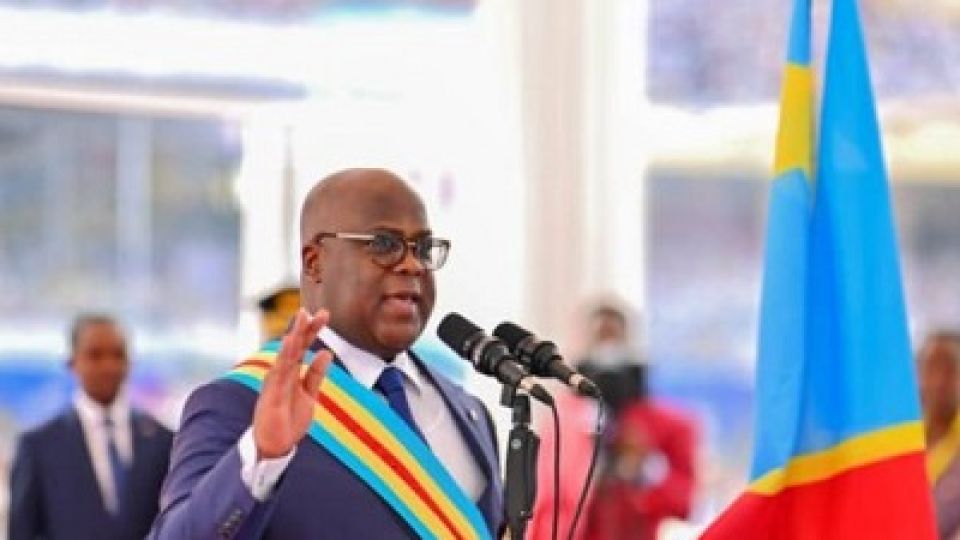from JEAN KASSONGO in Kinshasa, DRC
DRC Bureau
KINSHASA, (CAJ News) – ON the eve of the presidential inauguration in the Democratic Republic of Congo (DRC), the main opposition candidate, Moïse Katumbi, vowed to ratchet up his campaign against the re-election of Felix Tshisekedi.
That was despite the endorsement of Tshisekedi by several African and international countries ahead of the recently-conducted swearing-in at the Martyrs Stadium in the capital Kinshasa.
In an emailed response to CAJ News Africa’s questions this week, Katumbi had reiterated his rejection of the electoral results, characterizing them as “fraudulent.
Tshisekedi, who narrowly won in 2019, was declared the winner of the December 20 and 21 elections with over 73 percent of the votes, compared to Katumbi’s 18 percent.
Third-placed Martin Fayulu secured 5 percent.
Twenty other candidates, including Denis Mukwege, a Nobel Peace Prize in 2018, garnered around or under 1 percent each.
Katumbi’s rejection of the results has two elements to it. The first is based on the disqualification by DRC’s elections body of 82 candidates from Tshisekedi’s political party, the Union for Democracy and Social Progress, for vote fraud, which he insisted was only the tip of the iceberg.
Opposition-party and independent observers also reported widespread irregularities.
Katumbi said he and the other candidates who have also not accepted Tshisekedi’s re-election, have not sought legal recourse because they believe the country’s courts are captured by the ruling party.
“How do you approach a [court of law] that is compromised because of its composition … which has not respected any law of the republic or its own organic law?,” Katumbi said.
Although Tshisekedi started his second term last weekend, with leaders from the continent and other delegates from abroad present, Katumbi is undeterred in his resolve to exert pressure on Tshisekedi and the elections body, the Independent National Electoral Commission (CENI in its French acronym).
“We are working together with other candidates in order to defeat this election charade for the cancellation of this chaotic electoral process,” Katumbi said.
He did not elaborate on the plan or mention the other disgruntled candidates he is working with.
However, in a speech to the nation on January 3, he stressed the importance of saving democracy in the country and called for strong mobilisation of the Congolese people to defend their rights and their democratic aspirations. He also urged political parties and civil society organisations to work together.
Katumbi is dismayed by foreign governments’ acceptance of Tshisekedi’s re-election.
Leaders of several countries in the Southern African Development Community (SADC) and the East African Community – both of which the DRC is a member – attended Tshisekedi swearing-in.
The Pan African Parliament (PAP) and Western nations such as former colonial master Belgium, France, the United Kingdom (UK) and the United States (US) have also congratulated him.
Katumbi stated in his emailed response, “The electoral process was chaotic. This is a departure from democratic values. And if these countries are truly democratic, why not give the Congolese people the chance to experience the joy of electoral democracy?”
He said if the impasse was not resolved, “no single investor will come to partner with the illegitimate government in Kinshasa.”
Security experts warned that political gatherings and episodes of unrest remain possible nationwide through late January amid the presidential inauguration.
Increased security will likely persist in main urban centres such as Goma, Kinshasa and Lubumbashi.
Security measures such as roadblocks and identity checks, as well as large crowds, are projected to cause traffic and business disruptions.
“Protests denouncing Tshisekedi’s ‘victory’ remain possible,” said a security think-tank.
It added security forces will likely forcibly disperse such gatherings.
“Significant incidents of violence, clashes with security forces, opposing rival activists, and other forms of politically-related violence may occur.”
This is the latest chapter of instability since independence in 1960 for the resources-rich but poor Central African country previously known as Zaire.
– CAJ News

